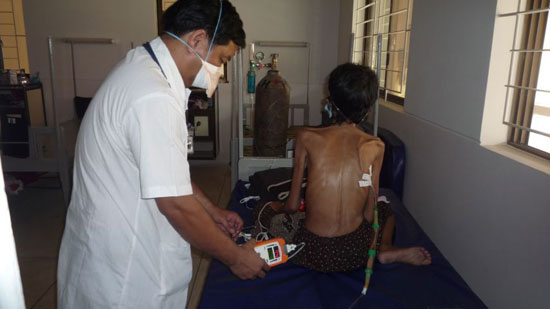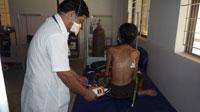In Kampong Cham, a small MSF team is working to improve TB care in the provincial hospital and fill gaps in a national system that is struggling to manage the region's high TB burden.

© Brigitte Breuillac/MSF
MSF staff treats a patient with TB inside Kampong Cham Provincal Hospital.
In Cambodia, just over 100 kilometres (62 miles) up the Mekong River, northeast of the capital Phnom Penh, lies a provincial town called Kampong Cham. Here, a small Doctors Without Borders/Médecins Sans Frontières (MSF) team is working hard to improve comprehensive tuberculosis (TB) care in the provincial hospital and fill gaps in a national system that is struggling to adequately manage the region's high TB burden.
MSF built a TB ward for Kampong Cham Provincial Hospital in 2009, and also upgraded its laboratory facilities. Since then, MSF has been providing staff, training, medicines, and material support to the hospital to help improve its ability to diagnose and treat TB patients effectively. The last quarter of 2010 saw big improvements, with a 25 percent higher TB detection rate. The team in Kampong Cham is now seeing about 120 patients each week with roughly one-third of those being new suspected TB cases.
The World Health Organization (WHO) estimates that 64 percent of all Cambodians carry the tuberculosis mycobacterium, and that at any time, 690 out of every 100,000 people in the country have the full-blown TB disease. Those numbers put Cambodia on the WHO’s list of the 22 countries with the highest rates of TB.
Tuberculosis is an opportunistic infection, meaning it takes advantage of weakened immune systems, and it is commonly spread through the air when an infected person coughs. In Cambodia, weakened immune systems are common due to malnutrition, HIV infection, age, or poor hygiene and living conditions.
Gaps in the national health system
Dr. Adrien Marteau, works in the TB ward MSF built within Kampong Cham Provincial Hospital. One of his patients, a 21-year-old woman, sticks out in his mind. She had slipped through the cracks of Cambodia's healthcare system and was put on two consecutive treatments regimes, both of them ineffective, lasting a year and a half. Finally, she was they referred her to the MSF-supported TB ward in Kampong Cham, where she was diagnosed with multi-drug resistant TB (MDR-TB).
"It's really a pity for this patient," said Dr. Marteau. "Both her lungs are very damaged; she will no longer be able to do any hard physical activity, to have a normal life. Now she is in the hospital because she's experiencing severe side-effects from the drug-resistant TB drugs. She cannot (eat) well…she's very malnourished, so the drugs are less effective. We don't know if she will be able to be cured or not—and it's very challenging. All of that because of a failing system, a lack of referral, and a problem of access to good care and a proper diagnosis."
Just two weeks later this patient passed away. She had started treatment for MDR-TB too late to save her life. The impact of cases such as this, where MDR-TB was not detected early enough can be devastating for patients and their families, and they demonstrate the reasoning behind MSF’s efforts to improve early detection and treatment strategies in the region.
Poverty compounds the problem
Cambodia's TB problems are compounded by poverty, with over 30 percent of all Cambodians living below the poverty line, according to the latest World Bank estimate from 2008. Many cannot afford to see a doctor when they become sick – it is often only when their illness becomes much worse that they arrive at the hospital for treatment. For this reason, MSF supports TB patients in Kampong Cham Provincial Hospital with free medicines, treatment, nutritious food during their hospital stay, and transport when necessary.
"You're speaking here of a disease that is impacting the lives of tens and tens of thousands in Cambodia," said MSF's Head of Mission for Cambodia, Emmanuel Lavieuville. “So you're talking of people who cannot go to school, that cannot learn, cannot work. Knowing that poverty is very high in Cambodia, you can imagine the overall impact. It's one of the biggest challenges for public health in the country today."
The paradox of children: more vulnerable, yet under-diagnosed
One of the most vulnerable groups for contracting TB is young children who have not yet developed a strong immune system. TB is also very difficult to detect in children; the disease is usually diagnosed by analysing a patient’s sputum – the fluid that comes up from the lungs, and which adults can produce when instructed. But it is much more difficult to get this from a young child.Even when they can produce sputum, the TB mycobacterium usually present in much smaller numbers. Also, children under five years old cannot easily communicate their symptoms or complaints, so doctors are left with more time-consuming means to diagnose them, which further delays treatment for a disease that is known to have a high mortality rate in young children. An improved TB diagnostic test urgently needs to be developed for children living in Cambodia and other resource-poor settings.
Dr. Marianne Gale, MSF’s medical advisor who is a specialist in diagnosing TB in children, visited the hospital in February this year in order to train the MSF team and Ministry of Health (MOH) hospital staff in the latest techniques. "It was quite clear that, just by visiting some of the wards at the hospital, there are children there with TB that we're just not able to pick up at the moment," said Dr. Gale. "And, similarly at the district hospital level, there were children there that I saw that were highly suggestive of having TB. So I think as the project continues to develop, and staff continue to be more aware of pediatric TB, the numbers of children being detected and treated here are only going to improve – and that will be really great to see."
Coping with isolation and economic hardship
Isolation can be difficult for patients with drug-resistant forms of TB in Kampong Cham, especially when one is the key source of income for one’s family. DR-TB patients are required to stay in hospital for longer periods than general TB patients, and consequently cannot return to work right away. This often means their whole family can suffer economically. To minimize this problem, once drug-resistant TB patients have been stabilized and finished the first phase of their treatment, MSF sends them home to continue their treatment. MSF identifies a local nurse in their area for home-based care (HBC), and supplies them with drugs and other necessary supplies and support. MSF staff visit regularly to make sure the home is safe for the patient’s family, and to ensure the patient is taking medication.
"We have to make sure that the nurse goes every day to visit and give the medication to the patient," said Claire Villeneuve, MSF's TB nurse supervisor in Kampong Cham.
"Also, we ask them about the side-effects, how they are feeling, do they have any support from their family, and do they have any social issues. MSF can support them with these issues. Also we have to assess their house to know if it's safe for the patient and their family to be at home. Sometimes MSF can support them with that, and can build a new room, a specific room for this patient to isolate them from the other members of the family."
Planning for the future
MSF will soon acquire new equipment to allow for more efficient screening, and will continue to strengthen its work in Kampong Cham Provincial Hospital. The team plans to expand its assistance over the coming months and years to include a select number of district hospitals, with the aim of helping some marginalized groups in the region to access treatment.
It's difficult to anticipate how long MSF's assistance will be needed in Cambodia. Tuberculosis will likely remain a considerable challenge for the country’s health system for many years. Through MSF’s long-term involvement in treating TB in rural Cambodia, and by training of MOH staff in high-quality comprehensive TB care, MSF is hopeful that this project will help contribute to the formulation of new approaches and the development of new tools for diagnosing and treating TB. At the same time, Cambodia's healthcare system may grow to be able to manage its TB burden; in the coming years the country expects to see increased international donor involvement.
"Cambodia is one of the countries in the area that have a lot of needs," said Emmanuel Lavieuville, “and it's difficult to anticipate that things are going to be so much better in the field of TB in such a short period of time. We can surely hope, but more importantly we can contribute to finding adapted field-designed strategies backed up with relevant tools. The TB patients are in such a need of more effective diagnostic tools than the very dated and complicated ones currently at our disposal."
MSF has been working with Cambodians since 1979, and until recently was focused on treating HIV/AIDS patients in several locations throughout the country. MSF has steadily handed over most of its HIV programs to the Ministry of Health (MOH) and has shifted its focus to TB.




